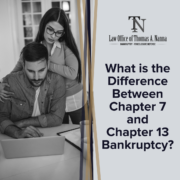What is the Difference Between Chapter 7 and Chapter 13 Bankruptcy?
When filing bankruptcy, there are two options to consider, Chapter 7 and Chapter 13. While both provide relief, the way your debt is handled differs with each. Regardless of whether you file Chapter 7 or Chapter 13, you should engage a qualified bankruptcy law firm with experienced bankruptcy lawyers that can help determine the best course of action for your specific situation. Let’s take a look at the basic differences between Chapter 7 and Chapter 13:
Chapter 7 Bankruptcy
Filing bankruptcy under Chapter 7 provides debt relief for most types of unsecured debt. If you qualify, your bankruptcy lawyer will discuss how this specifically works in your case. Chapter 7 often includes liquidating assets, dismissing unsecured debt and offers protection from creditors. Examples of debt that may not be discharged through filing bankruptcy under Chapter 7 include tax burdens, student loans, debt incurred as part of a DUI, debt arising out of fraud, criminal / court fines, alimony and child support.
Chapter 13
Filing bankruptcy under Chapter 13 is more of a debt consolidation and reorganization process. Your bankruptcy attorney may recommend this if you still wish to make good on your debts and/or you do not qualify for filing bankruptcy under Chapter 7. Chapter 13 gives you some breathing room by allowing you to consolidate your debts and pay one monthly payment over a designated amount of time (often three to five years).
If you are considering filing bankruptcy, the Law Office of Thomas A. Nanna can help. Our experienced bankruptcy lawyer will provide you with the guidance and direction to help you achieve the relief you need. Don’t trust just anyone when filing bankruptcy. Tampa Bay residents have come to rely on our knowledge, experience and compassion to help them navigate through difficult times. Give us a call to learn more today!






